Taking samples of more than 1,600 people who escaped quarantine in the epidemic center of Da Nang and returned to Nghe An
(Baonghean.vn) - In the face of the complicated developments of the Covid-19 epidemic, Nghe An Newspaper had an interview with Dr. Nguyen Van Dinh - Director of the Center for Disease Control (CDC) Nghe An about the situation of citizens fleeing from epidemic areas as well as the current situation of Covid-19 prevention and control in Nghe An.
PV:First, could you please give us an overview of the Covid-19 prevention and control situation in Nghe An recently?
Dr. Nguyen Van Dinh:Over the past time, Nghe An has implemented many synchronous and drastic solutions throughout the Covid-19 epidemic in Vietnam. As of August 14, Nghe An is quarantining nearly 4,000 people to prevent the epidemic. Of these, about 700 people are quarantined at the provincial level and quarantined and treated at medical facilities. Nearly 600 people are quarantined at the district level. The rest are quarantined at home. To date, Nghe An CDC has taken samples for testing of nearly 20,000 cases, all of which have negative results for Covid-19.
 |
| Dr. Nguyen Van Dinh: Photo: Tien Hung |
PV:Since the epidemic re-emerged in Da Nang after 99 days of Vietnam having no community infections, a large number of people from other provinces and cities have returned to their hometown in Nghe An. So, what actions has the unit taken in response to this situation?
Dr. Nguyen Van Dinh:Immediately after the epidemic re-emerged in Da Nang, Quang Nam and some other localities, we advised the Provincial Steering Committee for Covid-19 Prevention and Control and the Department of Health to issue many documents to serve the work of monitoring people from Da Nang, Quang Nam and other epidemic provinces to Nghe An to implement quarantine, health monitoring, and conduct sample collection for testing.
At the same time, we also advise the Department of Health to guide public and non-public hospitals to strengthen their proactive work in detecting, classifying, and screening suspected patients for timely treatment, avoiding cross-infection between patients in hospitals.
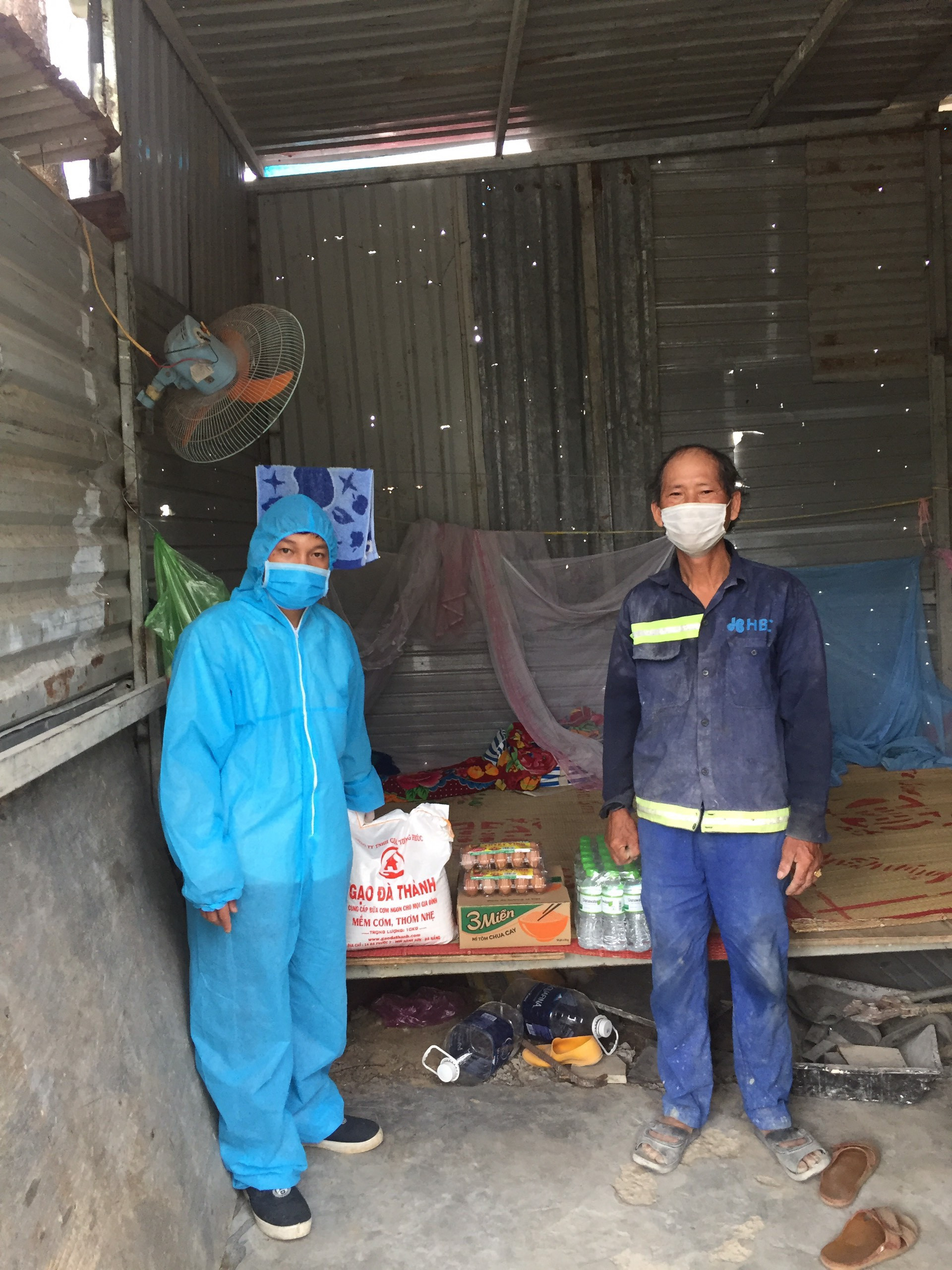 |
| A worker from Nghe An had to ask for support from the community during his days of unemployment due to the epidemic in Da Nang. Photo: KH |
PV:According to the information we have, recently there has been a large number of people escaping social distancing from epidemic areas returning. Has CDC Nghe An received this information, sir?
Dr. Nguyen Van Dinh:It is true that some people fled back to their hometowns and refused to make a medical declaration. Thanks to people living nearby who discovered and reported it, the local authorities were able to isolate them and take samples for testing. According to reports from districts, towns and cities in Da Nang city alone, within about half a month since the city began implementing social distancing, about 1,600 people have fled back to their hometowns in Nghe An, violating Directive 16 of the Prime Minister.
These people often travel by private cars, small 5-7 seater cars or trucks to avoid the authorities. According to some people, they often walk through the Da Nang bypass, gather at a safe location and then contact relatives in Nghe An to drive to pick them up.
There are many cases where people even “evade” by leaving Da Nang, stopping by another locality for a few days on the way before returning to Nghe An. When they return home, they declare that they did not come from Da Nang but from another province without the epidemic. There are some cases where when discovered, they resist and refuse to go into quarantine.
For these people, after receiving the information, we will send rapid response teams to coordinate with the local authorities to investigate, verify, and send them to centralized quarantine according to regulations. At the same time, we also take samples for testing of all these people. If they are quarantined for 14 days and the result is negative for Covid-19, and their health is stable, with no symptoms of the epidemic, they will be released to the community.
PV:Citizens who flee from epidemic areas will pose a very high risk of spreading the disease to the community if not detected promptly. So, what measures does Nghe An have to control this problem?
Dr. Nguyen Van Dinh:The Steering Committee for Covid-19 Prevention and Control of Nghe An province has issued many documents requesting the Steering Committees at district and commune levels to continuously check people entering and leaving the area. If any cases of people returning from other places are discovered, they must be immediately investigated and verified, and then classified.
Da Nang has been socially isolated according to Prime Minister's Directive 16 since 0:00 on July 28 with the direction "family isolates from family, residential group isolates from residential group, village isolates from village",..
People are required to stay at home and only go out in cases of real necessity such as buying food, medicine, emergencies, working at factories, production facilities, service businesses, essential goods that are not closed, suspended, and other emergencies.
Da Nang City has set up many checkpoints to control people entering and leaving. Passenger vehicles passing through the city are not allowed to stop to pick up or drop off passengers.
In addition, Thua Thien - Hue also set up a checkpoint right at the foot of Hai Van Pass to control people leaving from Da Nang.
However, we would also like to request that local authorities take measures to punish these escapees, because they have violated Directive 16 of the Prime Minister. The handling must be both a deterrent and educational measure, but also help prevent and control the epidemic effectively. In addition, we also request that local authorities strengthen supervision and grasp the area to detect as soon as possible any escapees from epidemic areas, to promptly quarantine them, avoiding risks to the community.
We also recommend that people strictly comply with the Government's regulations. They should proactively declare their health status and implement epidemic prevention measures as instructed by the Ministry of Health, such as wearing masks. Do not post false information on social networks that cause public confusion, affect security, order, and epidemic prevention and control.
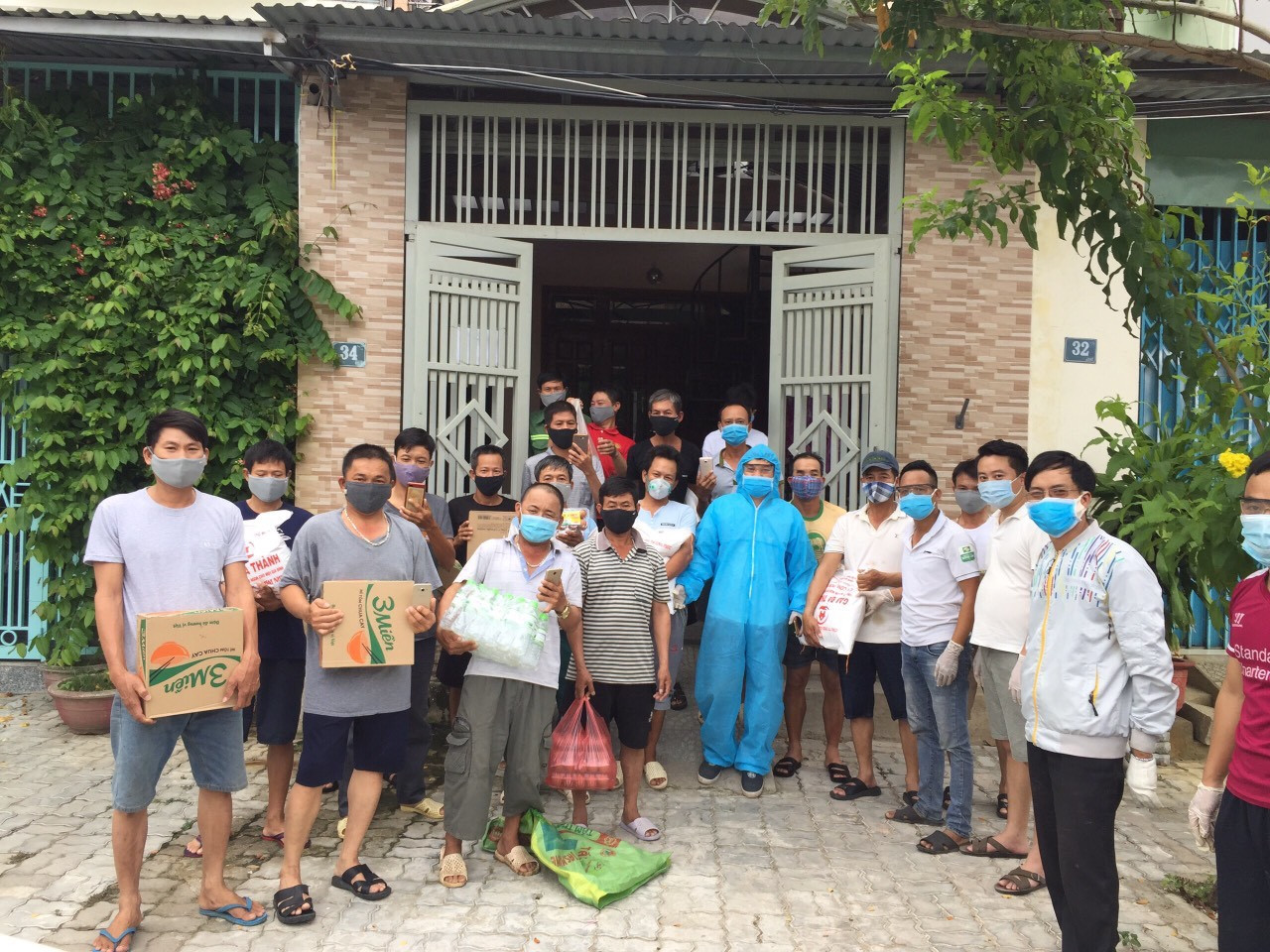 |
| A group of more than 150 workers from Yen Thanh at a shelter. Photo: KH |
PV:To effectively prevent and control the epidemic, timely contact tracing is considered very important. So how is this work carried out by CDC Nghe An, sir?
Dr. Nguyen Van Dinh:Regarding tracing work, we are currently implementing many synchronous solutions, gathering information from many sources, from the National Steering Committee, and then coordinating between provinces. We have many information channels, via Zalo, via internal pages and continuously connecting with other provinces. When there are suspected cases of Covid-19 infection, the provinces immediately notify. Upon receiving the information, within just a few minutes, we will be on the road immediately. In addition, we also receive a lot of feedback information through the hotline, through the personal Facebook of the officers in the unit.
However, the tracing process also encountered many difficulties. Because the patients were all from other provinces, when the disease was detected, they had traveled to many places and had contact with many people, while information was scarce, making it very difficult to trace. Many cases were like "looking for a needle in a haystack", when we received them, there was no name or specific address.
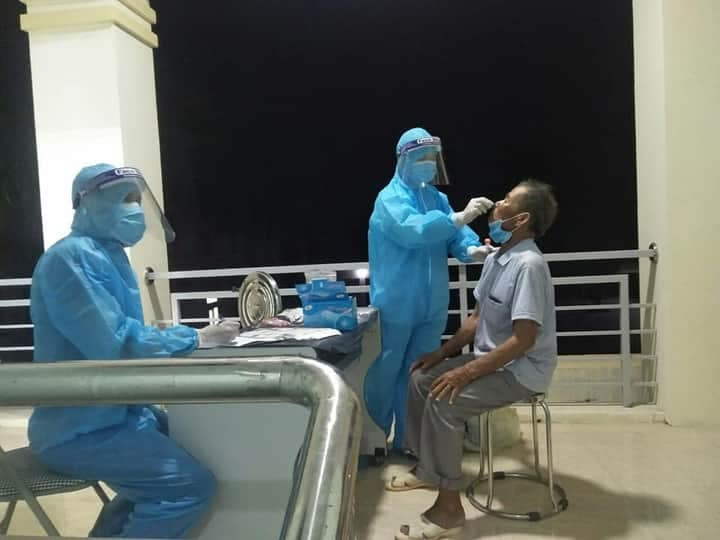 |
| Nghe An CDC stayed up all night taking samples to test F1s in the area. Photo: Tien Hung |
For example, the case of the passengers from Nghe An who were on the same bus as “patient 620”. This bus was from Da Nang to Hanoi, and one passenger tested positive upon arriving at his hometown in Ha Nam. The initial information we received was that there were passengers on this bus who got off in Nghe An, but there was no further information.
We immediately sent notices to the district and commune level steering committees to check if there were any suspicious people on that day. After widely publicizing the search for people on this bus, we received phone calls from people reporting and then sent a rapid response team to check, quarantine, and take samples for testing according to regulations. However, there were also cases where the information was too vague, so it took us 2 days to find them and quarantine them.
PV:Currently, what is Nghe An's Covid-19 testing capacity and which cases does the unit prioritize for sampling, sir?
Dr. Nguyen Van Dinh:We conduct testing 24/7, divided into shifts. We test 500-600 samples per day. We focus on testing high-risk groups. First are those who fled from Da Nang after the city implemented social distancing. Once detected, they will be sampled immediately and sent to centralized quarantine according to the direction of the Provincial Steering Committee.
In addition, there are citizens who returned from Da Nang and other epidemic areas before social distancing, but have symptoms of the disease. And another priority group is those who have been in close contact with infected cases, and their F2.
PV:What is your opinion on the development of the Covid-19 epidemic in the coming time?
Dr. Nguyen Van Dinh:The epidemic in the coming time will be very complicated both domestically and internationally. Nghe An has determined to always be ready to prepare all plans, from the issue of checking citizens in the area to quarantining and taking samples for testing. We have a scenario for the worst case of a positive case in the area, to have an effective treatment plan for patients, and not to let the epidemic spread to the outside community. However, to prevent the epidemic most effectively, not only the efforts of the health agency, but also the awareness of compliance of the whole community are needed.
PV:Thank you!

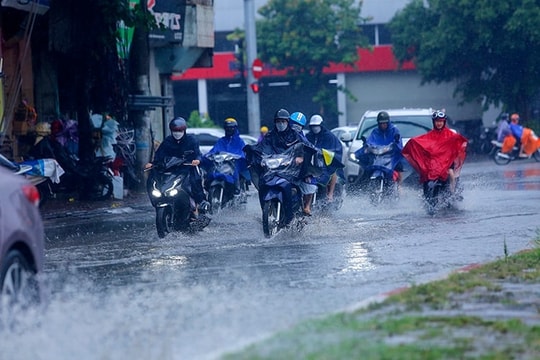

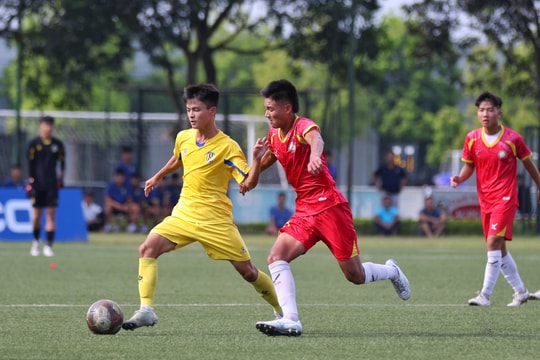
-68cf39fe31c3a3a8372f4112c5907d33.jpg)
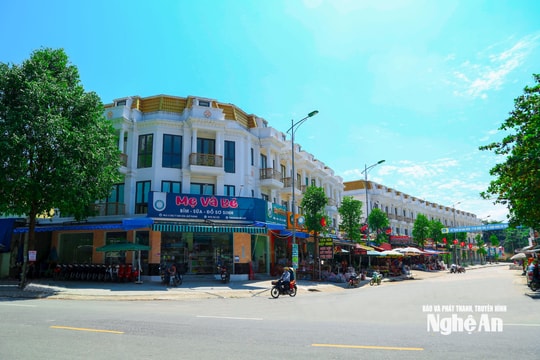
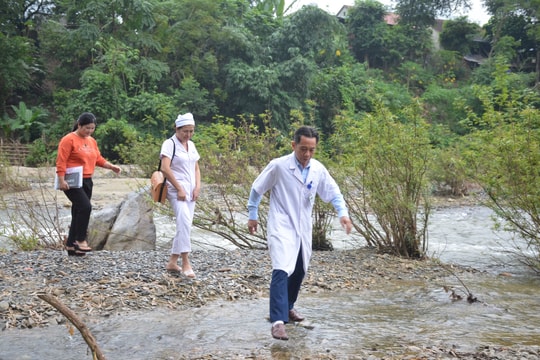
.jpg)
